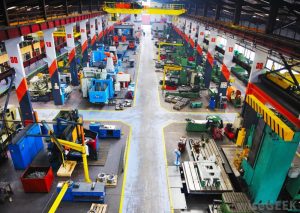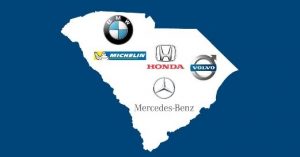“If I call you at 7:30 p.m. on a Friday evening, will you answer the phone and get my parts delivered to me on time?”
In a manufacturing ecosystem subject to tariffs, bad weather and port congestion, South Carolina firms along the supply chains of a BMW, Boeing, Volvo or Mercedes have been forced to ask such questions. It is a “Just in Time” necessity and the Palmetto State’s big players have set the rules and opposition of the game…For those who want to participate.
 “The supply chain must run seamlessly,” said Murat Aksel, BMW’s Senior Vice President of Purchasing and Supplier Network Americas.
“The supply chain must run seamlessly,” said Murat Aksel, BMW’s Senior Vice President of Purchasing and Supplier Network Americas.
Any disruption can lead to delays in production and impact customers, he said. The supply chain provides more than 70 percent of the value-add of BMW vehicles including seats, axles and bumpers.
And it is up to the suppliers to ensure their parts show up on time. It is on them to make successful deliveries of their finished product to the global automaker and maintain their spot on the “prized” vendor’s list.
Field Bradley, Vice President of Warehousing at Swafford Transport & Warehouse in Greer, said BMW requires international suppliers maintain at least thirty days of safety stock at his warehouses to mitigate the risk of disruption.
“If a major event occurs impacting production, it is the supplier who must expedite, usually by air, until safety stock is replenished,” he said.
And in South Carolina, we know about storms coming in off the ocean and wreaking havoc on shipments, don’t we?
Andgela Hobgood, ASAP Expediting & Logistics’ Business Development Manager, said when bad storms hit, roads are closed and most of the “LTL” transporters can’t come through.
The incident can delay a customer up to a week or more depending on the severity and increase the odds a line goes down, costing thousands of dollars each hour, she said.
And now South Carolina is more than a hub for luxury automakers and their plethora of suppliers, whether it be their incumbents following the large OEM’s across the ocean to someplace in Spartanburg, Greenville or Charleston Counties, or the new ones birthed by local folks in Orangeburg, Pickens or Union.
We are now building airplanes and transforming the Palmetto State into a global beacon for automotive and  aerospace manufacturing, and with brands like BMW, Volvo, Boeing and Lockheed, the truth validates the boast.
aerospace manufacturing, and with brands like BMW, Volvo, Boeing and Lockheed, the truth validates the boast.
In addition to weather issues, Hobgood pointed to the state’s rapid growth in the automotive and aerospace sectors as a chief culprit in delivery snags and delays.
The requirements for shipments are becoming complex, and there is an increasing demand for those shipments, she said. As a result, resources can diminish before getting the freight recovered in a timely manner.
And this industry perspective is more than a hunch.
Data compiled by the South Carolina Department of Commerce shows the aerospace industry’s annual economic impact is more than $19 billion, with a whopping 400 firms statewide employing 108,000 Sandlappers.
And as it turns out, “Just in Time” is a philosophy adopted by more than the folks scrambling to supply BMW, Mercedes, Honda or Volvo, it is also essential protocol for building airplanes and the parts that assemble them.
Jason Premo, Acclaim Advanced Manufacturing CEO, didn’t pull any punches on the need for timely delivery in aerospace saying, “there can be no excuse for delivering parts late at the risk of shutting down the assembly line of a $200 million Boeing 787, or even worse, delaying an important launch window at NASA or SpaceX.”
There must be services in place to leverage faster options and make up for lost time due to an unforeseen disruption, he said. And the disruptions are more than bad weather scenarios and port congestion, sometimes it is an urgent customer request, and an opportunity to “save the day”.
And when one considers the costs of lost production on an aerospace manufacturing floor, one needs little convincing.
As highlighted by Premo, typical internal measures vary from the direct labor and overhead costs incurred and range from $34 per hour to $75 per hour based on the machining workcenter category at a typical aerospace manufacturing facility.
“Not to mention, the lost opportunity and cost of sales ranging from $85 to $200 per hour,” he said.
Essentially, South Carolina’s true manufacturing center are its vital supply chains operating with one another to create a seamless train of production and delivery to ports across the world. To maintain this level of efficiency and to nurture our growing marketplace identity as “builder of things”, we can allow nothing to interfere with the state’s collective work flow.


Be the first to comment on "Where’s my parts? South Carolina’s dependency on seamless production"